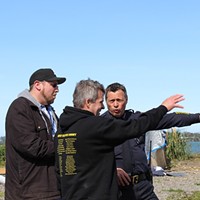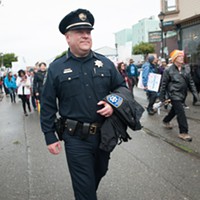Tuesday, June 6, 2017
Up and Down Old Town with Officer Crnich
Posted By Linda Stansberry @lcstansberry on Tue, Jun 6, 2017 at 1:15 PM
Eureka Police officer Cory Crnich’s beat stretches from Eureka’s Fourth Street north to the bay, from East Commercial Street to the library. Being the Old Town officer is a specialty position, one Crnich applied and reapplied for. He took the job in May of 2016, one week after the PalCo Marsh eviction. There’s no pay bonus but there are, according to Crnich, “unique opportunities and difficulties” that make it different from a regular patrol position. Four days a week, beginning at 8 a.m., Crnich walks up and down his beat, checking in on the people passed out in doorways, smoking at the Gazebo and making their way toward St. Vincent De Paul for food.
“It requires a little more patience than standard patrol work,” says Crnich. “There are two different extremes you’re working with, indigent folks and small business owners.”
The community policing practiced by Crnich, much of which involves just talking to the people he encounters in Old Town, learning names, faces and habits, and forming relationships, has shown its value over the last year, as in a Jan. 5 incident in which a man called in a threat of a mass shooting at or near the Humboldt County Courthouse. After reviewing surveillance footage of the gas station pay phone from which the threat came in, Crnich recognized one of his Old Town regulars – Bobby Ladd – and officers were able to find and detain him. Ladd was cited and released then connected with mental health services.
After dropping off his paperwork at the EPD annex at Third and E streets on April 3, Crnich begins his beat by talking to two men in a nearby alley, who are sleeping next to a set of steps. A giant bag of popcorn sits nearby, with kernels scattered about their feet. Crnich calls the men by name, asks the man who’s sleeping with one leg sticking out of a blanket to wake up.
“It’s time to go, guys,” he says. “I’m not going to see this cart later, am I?”
One man begins picking up the popcorn, piece by piece. Crnich asks the other man if he has been working with his Mobile Intervention Services Team worker. He shrugs.
“Why didn’t you go to mission last night?” Another shrug.
“What’s your plan for the day, Chris?”
“Free meal.”
“Okay, that’s at 11. What about after that?”
“Clothes.”
Chris walks away down the alley, the blanket thrown over his shoulder. Crnich continues his beat, knocking on the door of an RV parked along Third Street. An older man opens the door, and Crnich explains that there’s no camping on city streets. The two talk about where to park, about an upcoming funeral the man has come back into town to attend. As they talk, Chris wanders out the front door of another building, a small house divided into apartments and missing a lock on the front door.
Crnich walks down C Street to Madaket Plaza, and talks to three men under the awning of Jack’s Seafood, huddled with a dog. He asks their birthdates, where they came from. One, a 20-year old, says he was recently kicked out of a clean and sober house.
“What are your plans? Like your life plans?” Crnich asks him.
“I want to go to school, finish and go to college.”
Crnich claps his hands together once, briskly.
“Well then you have a plan for the day,” he says. “You’re going to find out where Adult Ed is and find out how to get back into school.”
He tells the two men to figure out what they’re going to do, and stick to it.
“You’re too young for this,” he says. “The longer you’re out here the harder it is to get out.”
Farther down the boardwalk, the officer stops to talk to a middle-aged man with a camping backpack and stainless steel water bottle. The man says he’s just traveling through from Indiana, seeing the country.
“Do you smoke weed?” Crnich asks him. “It’s not a trick question. People will offer to smoke you out, then steal your stuff here.”
He encourages the man to be careful and keep moving. The rest of the beat is similar, the faces familiar, the stories broken records. A man in a tracksuit and open bathrobe asks him for change. Crnich quiets him when he begins to swear and yell, investigates where he’s come from (San Francisco) and asks if he’d like to go back. In front of Los Bagels, an elderly woman sits on a walker, asking for change in defiance of the city’s panhandling ordinance. As Crnich stops to talk to a regular, a departing customer hands the woman a dollar behind his back.
A call comes in from dispatch reporting an RV parked next to Pacific Choice Seafood. When Crnich talks to the man sleeping there, he says he’s an employee at the fishery. As they sort it out, there is movement near the loading dock. Two men begin to disassemble a makeshift camp, with a tarp attached to the fence. A hypodermic syringe rests next to a hunk of watermelon and a burned out metal mixing bowl. Crnich calls the men by name, watches as they pack up and begin to move down the street. There’s not a whole lot he can do about the needle, he says, since state penalties for drug offenses have been deprioritized.
On the other side of the yard, employees moving pallets with a forklift ask the officer what to do with the needles they found. A bin of scrap wood is swimming with them. Crnich suggests they call the local harm reduction group to see if they’ll get them.
On Third Street, in front of St. Vincent de Paul's free meal, people hang out and fix bikes. They camp, they smoke, they yell. Crnich knows local business owners are unhappy, but ponders what would work best.
“Where should I send them?” he asks. “The Gazebo?”
On Thursdays, workers with the MIST team accompany him. Some people are housed. Some blow out of housing. There are a lot of new faces, he says, people coming from San Francisco and Redding. EPD maintains that many of the people on the streets of Old Town and elsewhere in Eureka are coming from out of town. Some business owners see it differently.
Paul Ambrosini, the son in Ambrosini and Sons Electric, says some customers come down to his family business at Third and A to pay their bills but don’t want to get out of their cars because of the presence of homeless people shouting, shooting up, smoking and creating a sense of danger.
“They’ve run people off other corners to ours,” he says of the police, adding that he understands that officers are in a no-win situation. “There’s no money in locking people up and letting them go.”
Ambrosini says he and other business owners saw an uptick in foot traffic and problems since the PalCo Marsh eviction in May of 2016. Calls for service records from EPD seem to support this observation. The Journal tallied all calls for service, excluding traffic stops, in an eight-block radius around St. Vincent DePaul over the last year. There were 27 such calls in April of 2016 followed by 73 in May. Comparing March and April of 2016 to March and April of 2017 shows an almost 70 percent increase in calls for the same area.
“It feels like the city let a lot of people down,” says Ambrosini. “It’s hard … the people getting screwed are the people on the streets. There’s no excuse for why this is going on.”
EPD Capt. Steve Watson says interpreting the data requires some nuance, adding that the number of people hanging around the Third and Commercial district “seems to have increased” after the closure of the temporary overnight sleeping areas, coinciding with a decrease in crime and calls for service to the blocks surrounding those areas (the foot of Del Norte Street, the overflow parking lot near the Wharfinger, the city parking lot at Koster and Washington).
“While many have been successfully housed, hospitalized, assisted back to their hometowns etc., there is a seemingly never-ending stream of transients flowing into our area, especially now that the summer and harvest months approach,” he says in an email. “Also, many of those from the PalCo days still on the streets include our most recalcitrant offenders who absolutely refuse to seek or accept assistance out of homelessness — they tell us and service providers they want to live the this way.”
A group of business owners in the Third and Commercial area gathered on May 5 to discuss the issue with EPD Chief Andrew Mills and Councilmember Marian Brady. Their complaints echoed those of business owners in a September 1995 meeting of the Eureka Main Street Merchants, as memorialized in a memo shared by Mills: Panhandling, urination, theft, congregating, the mentally ill, abusive/threatening language, citing and releasing offenders. Some of the solutions proposed at that meeting were implemented, and are still in use today: Offering bus tickets home, increased visual security, and more effective approaches to dealing with the homeless and mentally ill. Some ideas seem a little too far out to ever get off the ground, although versions of them periodically resurface in discussions of this issue: A boot camp in Oregon, mobilizing the National Guard to set up a tent city, declaring a state of emergency, moving/removing services. The suggestion to “remove abandoned buildings” and “bulldoze waterfront blight,” still sits in bureaucratic limbo. You can open a PDF of that memo here.
EPD recently launched a unique program that may thread the needle between business owners convinced that a saturation of services in their district is responsible for problems and the obvious need to provide said services. Particularly “disruptive” individuals will have services from St. Vincent DePaul withheld until they perform community service, such as pulling weeds or painting over graffiti. This “leveraged deterrence” will go along with other efforts to address concerns such as creating a day use area where people can stay and store belongings, eliminating graffiti and dispersing people immediately after lunch. A reverse marketing campaign aimed at deterring “transients” from coming to Eureka and plans to destroy the old railroad building are also in the works. It remains to be seen if this plan will be an antidote to a decades-old problem, the "solution" to which seems to have been mostly just shuffling people around.
In the meantime, there’s Crnich, checking in and moving people along, putting locks on the occasional shopping cart, trying to balance his responsibilities toward the different constituencies he serves. As he walks back up First Street toward the Gazebo, a man on a bike flags him down. Someone stole his cruiser, he says. He had it near his camp and someone took it. Could Crnich keep a look out for it?
“I think the universe is giving you a sign you should have less bikes,” Crnich says, only half-joking. But he agrees to keep an eye out.
“It requires a little more patience than standard patrol work,” says Crnich. “There are two different extremes you’re working with, indigent folks and small business owners.”
The community policing practiced by Crnich, much of which involves just talking to the people he encounters in Old Town, learning names, faces and habits, and forming relationships, has shown its value over the last year, as in a Jan. 5 incident in which a man called in a threat of a mass shooting at or near the Humboldt County Courthouse. After reviewing surveillance footage of the gas station pay phone from which the threat came in, Crnich recognized one of his Old Town regulars – Bobby Ladd – and officers were able to find and detain him. Ladd was cited and released then connected with mental health services.
After dropping off his paperwork at the EPD annex at Third and E streets on April 3, Crnich begins his beat by talking to two men in a nearby alley, who are sleeping next to a set of steps. A giant bag of popcorn sits nearby, with kernels scattered about their feet. Crnich calls the men by name, asks the man who’s sleeping with one leg sticking out of a blanket to wake up.
“It’s time to go, guys,” he says. “I’m not going to see this cart later, am I?”
One man begins picking up the popcorn, piece by piece. Crnich asks the other man if he has been working with his Mobile Intervention Services Team worker. He shrugs.
“Why didn’t you go to mission last night?” Another shrug.
“What’s your plan for the day, Chris?”
“Free meal.”
“Okay, that’s at 11. What about after that?”
“Clothes.”
Chris walks away down the alley, the blanket thrown over his shoulder. Crnich continues his beat, knocking on the door of an RV parked along Third Street. An older man opens the door, and Crnich explains that there’s no camping on city streets. The two talk about where to park, about an upcoming funeral the man has come back into town to attend. As they talk, Chris wanders out the front door of another building, a small house divided into apartments and missing a lock on the front door.
Crnich walks down C Street to Madaket Plaza, and talks to three men under the awning of Jack’s Seafood, huddled with a dog. He asks their birthdates, where they came from. One, a 20-year old, says he was recently kicked out of a clean and sober house.
“What are your plans? Like your life plans?” Crnich asks him.
“I want to go to school, finish and go to college.”
Crnich claps his hands together once, briskly.
“Well then you have a plan for the day,” he says. “You’re going to find out where Adult Ed is and find out how to get back into school.”
He tells the two men to figure out what they’re going to do, and stick to it.
“You’re too young for this,” he says. “The longer you’re out here the harder it is to get out.”
Farther down the boardwalk, the officer stops to talk to a middle-aged man with a camping backpack and stainless steel water bottle. The man says he’s just traveling through from Indiana, seeing the country.
“Do you smoke weed?” Crnich asks him. “It’s not a trick question. People will offer to smoke you out, then steal your stuff here.”
He encourages the man to be careful and keep moving. The rest of the beat is similar, the faces familiar, the stories broken records. A man in a tracksuit and open bathrobe asks him for change. Crnich quiets him when he begins to swear and yell, investigates where he’s come from (San Francisco) and asks if he’d like to go back. In front of Los Bagels, an elderly woman sits on a walker, asking for change in defiance of the city’s panhandling ordinance. As Crnich stops to talk to a regular, a departing customer hands the woman a dollar behind his back.
A call comes in from dispatch reporting an RV parked next to Pacific Choice Seafood. When Crnich talks to the man sleeping there, he says he’s an employee at the fishery. As they sort it out, there is movement near the loading dock. Two men begin to disassemble a makeshift camp, with a tarp attached to the fence. A hypodermic syringe rests next to a hunk of watermelon and a burned out metal mixing bowl. Crnich calls the men by name, watches as they pack up and begin to move down the street. There’s not a whole lot he can do about the needle, he says, since state penalties for drug offenses have been deprioritized.
On the other side of the yard, employees moving pallets with a forklift ask the officer what to do with the needles they found. A bin of scrap wood is swimming with them. Crnich suggests they call the local harm reduction group to see if they’ll get them.
On Third Street, in front of St. Vincent de Paul's free meal, people hang out and fix bikes. They camp, they smoke, they yell. Crnich knows local business owners are unhappy, but ponders what would work best.
“Where should I send them?” he asks. “The Gazebo?”
On Thursdays, workers with the MIST team accompany him. Some people are housed. Some blow out of housing. There are a lot of new faces, he says, people coming from San Francisco and Redding. EPD maintains that many of the people on the streets of Old Town and elsewhere in Eureka are coming from out of town. Some business owners see it differently.
Paul Ambrosini, the son in Ambrosini and Sons Electric, says some customers come down to his family business at Third and A to pay their bills but don’t want to get out of their cars because of the presence of homeless people shouting, shooting up, smoking and creating a sense of danger.
“They’ve run people off other corners to ours,” he says of the police, adding that he understands that officers are in a no-win situation. “There’s no money in locking people up and letting them go.”
Ambrosini says he and other business owners saw an uptick in foot traffic and problems since the PalCo Marsh eviction in May of 2016. Calls for service records from EPD seem to support this observation. The Journal tallied all calls for service, excluding traffic stops, in an eight-block radius around St. Vincent DePaul over the last year. There were 27 such calls in April of 2016 followed by 73 in May. Comparing March and April of 2016 to March and April of 2017 shows an almost 70 percent increase in calls for the same area.
“It feels like the city let a lot of people down,” says Ambrosini. “It’s hard … the people getting screwed are the people on the streets. There’s no excuse for why this is going on.”
EPD Capt. Steve Watson says interpreting the data requires some nuance, adding that the number of people hanging around the Third and Commercial district “seems to have increased” after the closure of the temporary overnight sleeping areas, coinciding with a decrease in crime and calls for service to the blocks surrounding those areas (the foot of Del Norte Street, the overflow parking lot near the Wharfinger, the city parking lot at Koster and Washington).
“While many have been successfully housed, hospitalized, assisted back to their hometowns etc., there is a seemingly never-ending stream of transients flowing into our area, especially now that the summer and harvest months approach,” he says in an email. “Also, many of those from the PalCo days still on the streets include our most recalcitrant offenders who absolutely refuse to seek or accept assistance out of homelessness — they tell us and service providers they want to live the this way.”
A group of business owners in the Third and Commercial area gathered on May 5 to discuss the issue with EPD Chief Andrew Mills and Councilmember Marian Brady. Their complaints echoed those of business owners in a September 1995 meeting of the Eureka Main Street Merchants, as memorialized in a memo shared by Mills: Panhandling, urination, theft, congregating, the mentally ill, abusive/threatening language, citing and releasing offenders. Some of the solutions proposed at that meeting were implemented, and are still in use today: Offering bus tickets home, increased visual security, and more effective approaches to dealing with the homeless and mentally ill. Some ideas seem a little too far out to ever get off the ground, although versions of them periodically resurface in discussions of this issue: A boot camp in Oregon, mobilizing the National Guard to set up a tent city, declaring a state of emergency, moving/removing services. The suggestion to “remove abandoned buildings” and “bulldoze waterfront blight,” still sits in bureaucratic limbo. You can open a PDF of that memo here.
EPD recently launched a unique program that may thread the needle between business owners convinced that a saturation of services in their district is responsible for problems and the obvious need to provide said services. Particularly “disruptive” individuals will have services from St. Vincent DePaul withheld until they perform community service, such as pulling weeds or painting over graffiti. This “leveraged deterrence” will go along with other efforts to address concerns such as creating a day use area where people can stay and store belongings, eliminating graffiti and dispersing people immediately after lunch. A reverse marketing campaign aimed at deterring “transients” from coming to Eureka and plans to destroy the old railroad building are also in the works. It remains to be seen if this plan will be an antidote to a decades-old problem, the "solution" to which seems to have been mostly just shuffling people around.
In the meantime, there’s Crnich, checking in and moving people along, putting locks on the occasional shopping cart, trying to balance his responsibilities toward the different constituencies he serves. As he walks back up First Street toward the Gazebo, a man on a bike flags him down. Someone stole his cruiser, he says. He had it near his camp and someone took it. Could Crnich keep a look out for it?
“I think the universe is giving you a sign you should have less bikes,” Crnich says, only half-joking. But he agrees to keep an eye out.
Speaking of...
Readers also liked…
more from the author
-
Lobster Girl Finds the Beat
- Nov 9, 2023
-
Tales from the CryptTok
- Oct 26, 2023
-
Graduation Day: A Fortuna Teacher Celebrates with her First Grade Class
- Jul 18, 2023
- More »













































